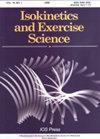The effects of a structured physiotherapy program on pulmonary function and walking capacity in obese and non-obese adults undergoing cardiac surgery
IF 0.7
4区 医学
Q4 ENGINEERING, BIOMEDICAL
引用次数: 0
Abstract
BACKGROUND: Obesity is thought to be a risk factor for cardiopulmonary diseases due to changed pulmonary mechanics. It also drastically lowers functional capability in both males and females. A routine physiotherapy program has been shown to be effective in the prevention and treatment of cardiopulmonary diseases. It also significantly increases functional capacity following coronary artery bypass grafting. However, the effect of a structured physiotherapy program in obese and non-obese patients has not been well explored. As such, the objective of this study is to determine the effect of a standardized physiotherapy program on pulmonary function and walking capacity in obese and non-obese patients undergoing coronary artery bypass grafting. METHODS: A prospective study was conducted on 50 obese (age 57.2 ± 6.3 Y) and non-obese (age 56.6 ± 5.7 Y) adults who were schedule for coronary artery bypass grafting. Their body mass index was used to separate them into two groups. Both groups followed a structured physiotherapy program from day 1 to day 7 post cardiac surgery. Both groups underwent spirometry test at baseline (preoperatively) and after day 4 and day 7 postoperatively as well as a six-minute walk test at baseline and on day 7 postoperatively. RESULTS: At baseline, obese individuals had significantly lower pulmonary and physical functioning. On postoperative day 4, both groups deteriorated, although the obese group deterioration was worse, in most of the pulmonary parameters. On postoperative day 7, both groups improved, though the non-obese group improved at a faster rate. In contrary, it was observed that the obese group improved more rapidly in terms of functional capacity. CONCLUSIONS: The study indicated that the outcomes of a structured physiotherapy program following coronary artery bypass grafting were different for persons who were obese compared to those who were not. Adipose tissue variations surrounding the rib cage, diaphragm, and visceral cavity may account for the observed rate of change between the two groups. Therefore, it is apparent that a new strategy for managing obese individuals who have undergone CABG is required.结构化理疗方案对接受心脏手术的肥胖和非肥胖成年人肺功能和行走能力的影响
背景:由于肺力学的改变,肥胖被认为是心肺疾病的危险因素。它还大大降低了男性和女性的功能能力。常规物理治疗方案已被证明在预防和治疗心肺疾病方面是有效的。它还显著提高了冠状动脉搭桥术后的功能能力。然而,结构化理疗计划对肥胖和非肥胖患者的影响尚未得到很好的探索。因此,本研究的目的是确定标准化理疗程序对接受冠状动脉搭桥术的肥胖和非肥胖患者肺功能和行走能力的影响。方法:对50名计划接受冠状动脉搭桥术的肥胖(年龄57.2±6.3岁)和非肥胖(年龄56.6±5.7岁)成年人进行前瞻性研究。他们的体重指数被用来将他们分成两组。两组患者在心脏手术后第1天至第7天均遵循结构化物理治疗方案。两组均在基线(术前)、术后第4天和第7天进行肺活量测试,并在基线和术后第7天接受6分钟步行测试。结果:在基线时,肥胖个体的肺功能和身体功能显著降低。术后第4天,两组的大多数肺部参数都有所恶化,尽管肥胖组的恶化更严重。术后第7天,两组都有所改善,但非肥胖组的改善速度更快。相反,观察到肥胖组在功能能力方面改善得更快。结论:研究表明,在冠状动脉搭桥术后,肥胖者和非肥胖者的结构化物理治疗计划的结果不同。胸腔、膈肌和内脏腔周围的脂肪组织变化可能是两组之间观察到的变化率的原因。因此,很明显,需要一种新的策略来管理接受CABG的肥胖个体。
本文章由计算机程序翻译,如有差异,请以英文原文为准。
求助全文
约1分钟内获得全文
求助全文
来源期刊

Isokinetics and Exercise Science
医学-工程:生物医学
CiteScore
1.20
自引率
14.30%
发文量
37
审稿时长
>12 weeks
期刊介绍:
Isokinetics and Exercise Science (IES) is an international journal devoted to the study of theoretical and applied aspects of human muscle performance. Since isokinetic dynamometry constitutes the major tool in this area, the journal takes a particular interest in exploring the considerable potential of this technology.
IES publishes studies associated with the methodology of muscle performance especially with respect to the issues of reproducibility and validity of testing, description of normal and pathological mechanical parameters which are derivable from muscle testing, applications in basic research topics such as motor learning paradigms and electromyography. The journal also publishes studies on applications in clinical settings and technical aspects of the various measurement systems employed in human muscle performance research.
The journal welcomes submissions in the form of research papers, reviews, case studies and technical reports from professionals in the fields of sports medicine, orthopaedic and neurological rehabilitation and exercise physiology.
 求助内容:
求助内容: 应助结果提醒方式:
应助结果提醒方式:


